Are you passionate about healthcare and helping others? Have you ever considered becoming a medical assistant? A medical assistant plays a pivotal role in the healthcare industry, providing vital support to medical professionals and ensuring smooth operations in medical facilities.
Whether you’re interested in administrative tasks or want to be involved in clinical responsibilities, a career as a medical assistant offers a fulfilling and rewarding path. The American Association of Medical Assistants is one of the leading professional organizations that sets high standards for medical assisting and promotes the recognition of this essential role in healthcare.
If you’re ready to embark on this exciting journey, enrolling in a reputable medical assistant program is crucial. These programs provide comprehensive education and training, equipping you with the knowledge and skills needed to excel in your role as a medical assistant.
Key Takeaways
- Becoming a medical assistant offers a rewarding career in the healthcare field.
- The American Association of Medical Assistants sets high standards for medical assisting.
- Enrolling in a reputable medical assistant program is essential for proper education and training.
- Medical assistants perform crucial administrative and clinical tasks in healthcare settings.
- Considered a gateway to healthcare, a medical assistant career opens up various career opportunities.
What is a Medical Assistant?
A medical assistant is a crucial member of the healthcare team who performs both administrative and clinical tasks to support healthcare providers. They play a vital role in ensuring the smooth operation of medical facilities, which allows physicians and other healthcare professionals to focus on providing quality care to patients.
Medical assistants work in a variety of healthcare settings, including hospitals, clinics, and outpatient facilities. They are often the first point of contact for patients, helping to create a welcoming and efficient environment. Administrative tasks are an essential part of a medical assistant’s responsibilities, and they are proficient in managing paperwork, scheduling appointments, maintaining medical records, and coordinating insurance billing.
Medical assistants are the backbone of any medical practice, ensuring that administrative processes run smoothly, allowing healthcare providers to focus on patient care.
In addition to administrative duties, medical assistants work closely with healthcare providers to assist in clinical tasks. They may perform basic medical procedures, such as taking vital signs, preparing patients for examinations, and collecting laboratory samples. Medical assistants are trained to perform these tasks with precision and efficiency, adhering to established protocols to maintain patient safety.
The role of a medical assistant requires excellent communication and interpersonal skills, as they interact with patients, healthcare providers, and other members of the healthcare team on a daily basis. They must be detail-oriented and possess strong organizational abilities to manage multiple tasks simultaneously.
Overall, medical assistants play a vital role in healthcare facilities, providing essential administrative support and contributing to the overall patient experience. Their dedication and expertise enable the delivery of efficient and high-quality care, making them indispensable members of the healthcare team.
Clinical Responsibilities of a Medical Assistant
Medical assistants play a crucial role in healthcare settings, performing a range of clinical tasks that contribute to patient care and support healthcare professionals. As part of their clinical responsibilities, medical assistants are trained to efficiently and accurately measure and record vital signs, assist in basic laboratory tests, and provide valuable support during medical procedures.
Taking Vital Signs
One of the core clinical tasks of a medical assistant is taking vital signs, which include measuring a patient’s temperature, pulse rate, respiratory rate, and blood pressure. With their expertise and precision, medical assistants gather essential information to help healthcare providers assess the patient’s overall health and detect any abnormalities or changes that may require further attention. By ensuring accurate vital sign measurements, medical assistants contribute to the delivery of high-quality patient care.
Assisting with Laboratory Tests
In addition to measuring vital signs, medical assistants also assist in basic laboratory tests, under the direction and supervision of healthcare professionals. These tests may include collecting and processing blood samples, preparing specimens for testing, and performing venipuncture procedures. By skillfully handling laboratory tasks, medical assistants contribute to the smooth operation of healthcare facilities and help facilitate timely diagnosis and treatment for patients.
“Medical assistants are indispensable in the clinical setting, supporting healthcare professionals in delivering excellent patient care. Their ability to accurately measure vital signs and assist with laboratory tests helps ensure accurate diagnosis and effective treatment plans.”
Medical assistants undergo comprehensive training to develop the technical skills and knowledge needed to perform clinical tasks with proficiency. Additionally, they learn the importance of maintaining a safe and sterile environment to protect both patients and themselves during procedures. By effectively carrying out their clinical responsibilities, medical assistants contribute to the positive healthcare experiences of patients and help improve overall healthcare outcomes.
Next, we will explore the educational and training requirements for individuals aspiring to become medical assistants, as well as the varied career opportunities available in this dynamic profession.
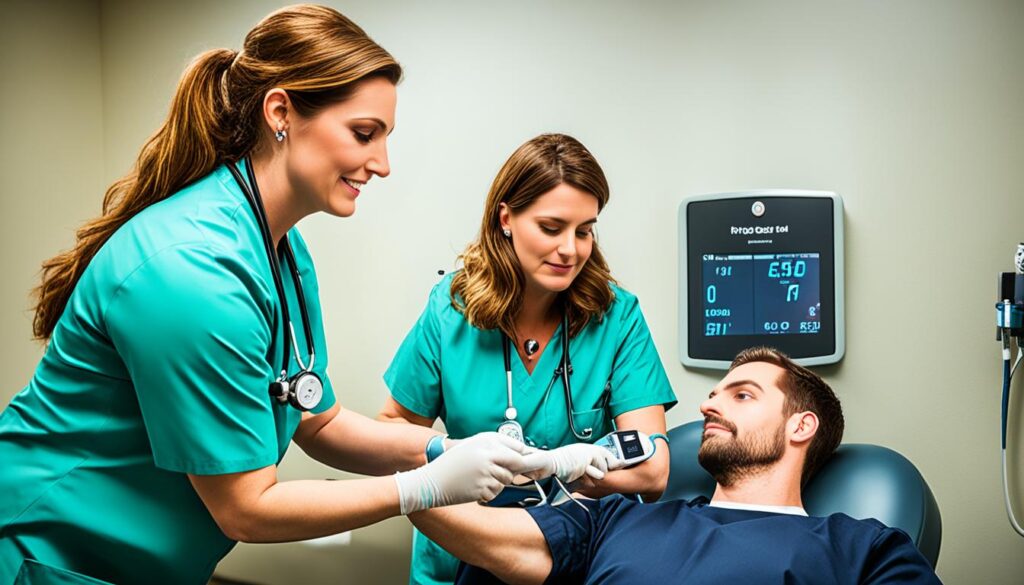
Education and Training for Medical Assistants
To embark on a successful career as a medical assistant, it is crucial to have the right education and training. Medical assistant programs offered by vocational schools and allied health education programs provide comprehensive training and a solid foundation for aspiring medical assistants.
Choosing the Right Program
When considering a medical assistant program, it’s essential to select one that is accredited and meets the industry standards. Look for programs that are accredited by reputable organizations, such as the Commission on Accreditation of Allied Health Education Programs (CAAHEP) or the Accrediting Bureau of Health Education Schools (ABHES).
A diploma or certificate program in medical assisting can typically be completed in less than a year. These programs cover essential topics such as medical terminology, anatomy and physiology, medical office procedures, and basic clinical skills.
Curriculum and Hands-on Experience
Medical assistant programs offer a well-rounded curriculum that combines both classroom instruction and hands-on training. Students gain the necessary skills and knowledge to assist healthcare professionals effectively in a variety of clinical and administrative tasks.
During the course of their training, students have the opportunity to practice and refine their clinical skills, including taking vital signs, performing basic laboratory tests, and assisting with patient examinations. They also learn important administrative duties such as managing medical records, scheduling appointments, and billing procedures.
Externship and Certification
Many medical assistant programs include an externship component, providing students with real-world experience in healthcare settings. This hands-on training allows students to apply their knowledge and skills under the supervision of experienced medical professionals.
Upon completion of an accredited medical assistant program, graduates are eligible to sit for certification exams offered by professional organizations such as the American Association of Medical Assistants (AAMA) or the American Medical Technologists (AMT). Certification is not required to work as a medical assistant, but it demonstrates a commitment to professionalism and may enhance employment opportunities.
“Completing a medical assistant program from a reputable vocational school or allied health education program is an excellent step towards a rewarding career in the healthcare field.”
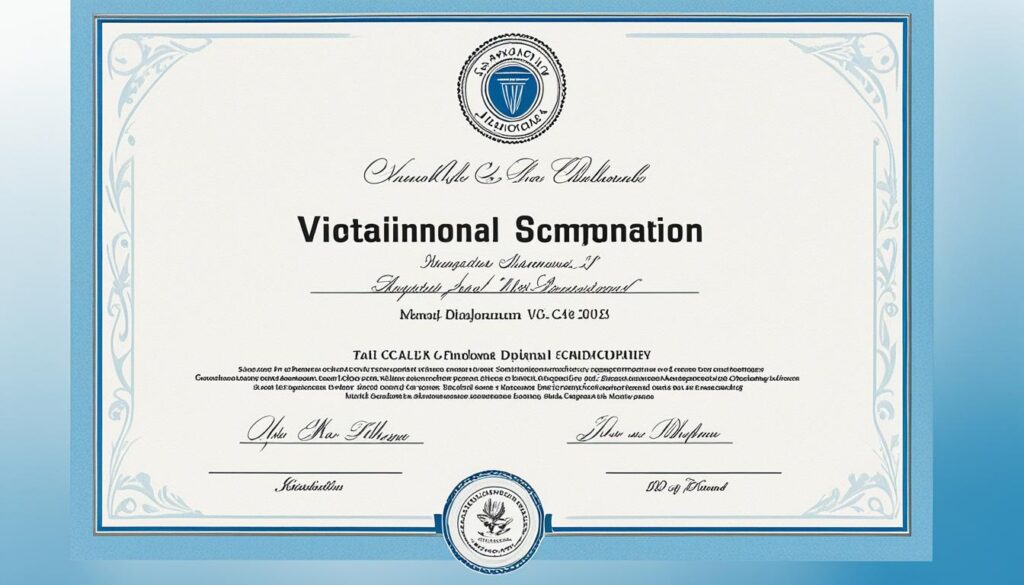
Certification and Accreditation for Medical Assistants
Obtaining proper certification and accreditation is crucial for medical assistants to establish their professional credibility and enhance their career prospects. Medical assistant certification validates an individual’s competence in performing the necessary tasks and responsibilities of the role. Additionally, accreditation ensures that medical assistant training programs meet the required standards set by reputable organizations.
One notable organization that provides certification for medical assistants is the American Medical Technologists (AMT). AMT offers the Registered Medical Assistant (RMA) certification, which demonstrates a medical assistant’s proficiency in administrative and clinical skills. This certification is recognized nationwide and widely accepted by employers in the healthcare industry.
Similarly, the Commission on Accreditation of Allied Health Education (CAAHEP) plays a significant role in accrediting medical assistant training programs. CAAHEP ensures that these programs meet the established educational standards, providing students with the necessary knowledge and skills to excel in their profession. Accreditation from CAAHEP enhances the credibility of the program and allows graduates to be well-prepared for the demands of their future careers.
The Role of Certification
Medical assistant certification demonstrates a commitment to professionalism and ongoing education. It verifies that an individual has the knowledge and skills required to perform the various duties and responsibilities expected of a medical assistant. Certification elevates the status of medical assistants and sets them apart from their non-certified counterparts.
Furthermore, many employers prefer to hire certified medical assistants as they can be confident in their capabilities and expertise. Certified medical assistants are often more competitive in the job market and may have access to better job opportunities and higher salaries.
Medical assistant certification also allows for professional growth and advancement. With certification, medical assistants may be eligible for additional responsibilities within their workplace, such as supervisory roles or specialized tasks. It can also open doors to pursuing further education or specialized certifications in areas such as phlebotomy or electrocardiography.
Accreditation for Training Programs
Accreditation is equally vital for medical assistant training programs. When a program is accredited, it means that it has met the rigorous standards and guidelines set by accrediting bodies such as CAAHEP. Accredited programs provide students with the assurance that they are receiving a quality education that aligns with industry standards.
Accreditation ensures that the curriculum covers essential topics, including medical terminology, anatomy and physiology, pharmacology, clinical procedures, and administrative tasks. It also ensures the availability of well-trained and qualified instructors who can effectively teach and mentor students.
Graduating from an accredited medical assistant program can enhance employment opportunities. Employers are more likely to hire graduates from accredited programs as they know these individuals have received comprehensive training and are better prepared for the demands of the job. Accreditation can give job seekers a competitive edge in a field that values competence and professionalism.
Overall, certification and accreditation are essential for medical assistants and medical assistant training programs, respectively. They provide validation, enhance professional credibility, and open doors to new and exciting opportunities within the healthcare industry.
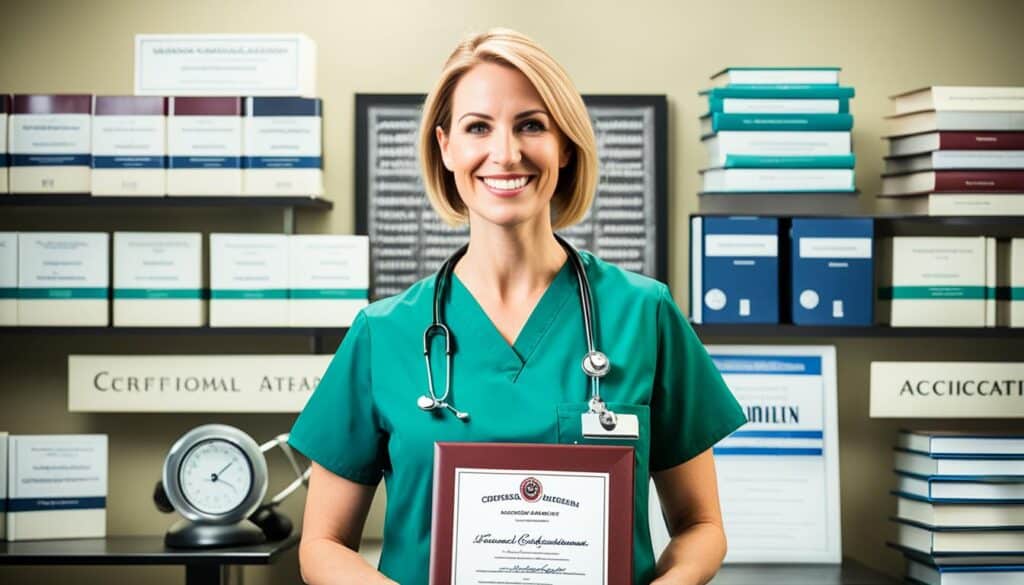
Duties and Responsibilities of a Medical Assistant
As a medical assistant, you’ll have a wide range of responsibilities that encompass both administrative and clinical tasks. From ensuring smooth operations in a healthcare facility to providing direct patient care, medical assistants play a crucial role in delivering high-quality healthcare.
Administrative Duties
One of the key components of a medical assistant’s role is managing administrative tasks. This includes scheduling appointments, maintaining patient records, and handling billing and insurance processes. Additionally, medical assistants may also be responsible for greeting patients, answering phone calls, and managing correspondence to ensure efficient communication within the healthcare facility.
Clinical Duties
In addition to administrative responsibilities, medical assistants are trained to perform various clinical tasks. These may include taking and recording vital signs such as blood pressure and pulse rate, preparing patients for examinations, and assisting healthcare professionals during medical procedures. Medical assistants may also be involved in conducting basic laboratory tests, sterilizing equipment, and administering medications under the supervision of licensed healthcare providers.
Also Read:- What Opportunities Does Medical Education Offer?
Medical Terminology
A comprehensive understanding of medical terminology is essential for medical assistants to effectively communicate with healthcare professionals and patients. Medical assistants often transcribe medical reports, update patient charts, and accurately document healthcare information. Proficiency in medical terminology not only ensures accurate record-keeping but also facilitates effective collaboration within the healthcare team.
Overall, medical assistants play a vital role in ensuring the smooth functioning of a healthcare facility. By managing administrative tasks, performing clinical duties, and utilizing their knowledge of medical terminology, medical assistants contribute to the efficient and effective delivery of healthcare services.
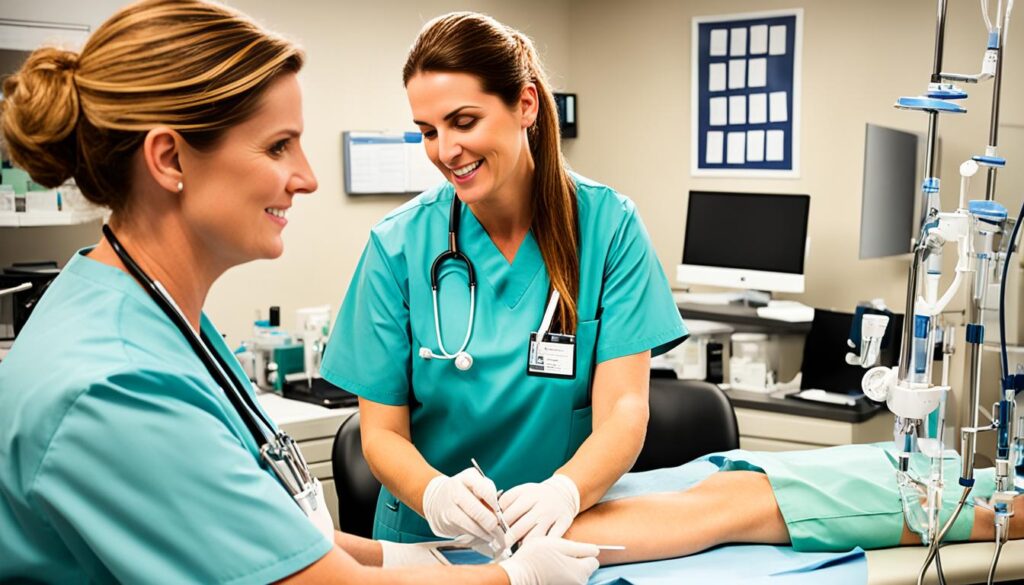
Career Opportunities for Medical Assistants
Medical assistants play a crucial role in various healthcare facilities, opening up numerous career opportunities in the field. With the increasing demand for healthcare services, the employment of medical assistants is projected to grow steadily in the coming years.
Medical offices and clinics are among the primary employers of medical assistants. These facilities provide essential healthcare services to patients, ranging from general check-ups to specialized treatments. Medical assistants contribute to the smooth functioning of these establishments by assisting healthcare professionals and ensuring efficient patient care.
Job growth in the medical assisting field is expected to be promising, with a steady rise in job openings. As medical facilities continue to expand and healthcare services become more accessible, the need for skilled medical assistants continues to rise. This growth offers aspiring medical assistants a wide range of employment opportunities, providing a stable and rewarding career.
“Medical assistants are the backbone of medical offices and clinics. Their dedication and support contribute to the overall efficiency of healthcare operations.” – Dr. Sarah Thompson, Family Physician
In addition to medical offices and clinics, medical assistants may also find employment in various other medical facilities. This includes hospitals, urgent care centers, nursing homes, and outpatient clinics. The diverse nature of these healthcare settings provides medical assistants with the chance to gain valuable experience and expand their skill sets.
Whether working in a bustling clinic or a specialized medical practice, medical assistants play a vital role in delivering quality patient care. From administrative tasks like scheduling appointments and managing patient records to assisting with clinical procedures, their contributions significantly impact the overall healthcare experience.
Projected Job Growth for Medical Assistants (2019-2029)
| Industry | Projected Job Growth |
|---|---|
| Medical Offices and Clinics | 23% |
| Hospitals | 19% |
| Outpatient Care Centers | 31% |
| Nursing and Residential Care Facilities | 17% |
Source: U.S. Bureau of Labor Statistics Occupational Outlook Handbook
The growing demand for healthcare services and the essential role played by medical assistants make this profession a promising and fulfilling career choice. As the backbone of medical facilities, medical assistants have the opportunity to contribute to the well-being of patients and work alongside dedicated healthcare professionals.
Whether working in medical offices, clinics, hospitals, or other healthcare facilities, medical assistants are integral to the efficient functioning and delivery of quality patient care.
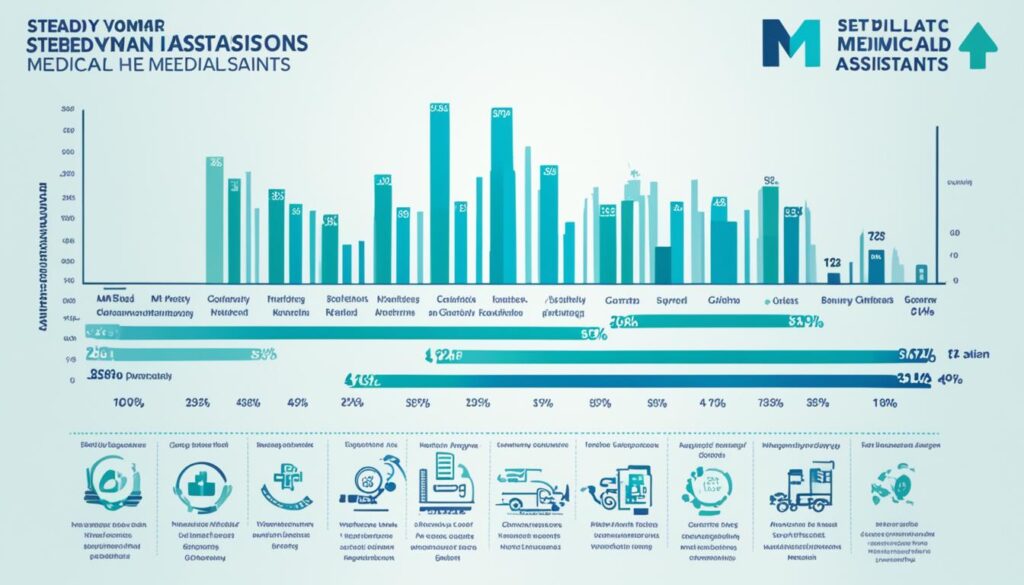
Skills and Qualities of a Successful Medical Assistant
Being a medical assistant requires a diverse skill set and a unique set of qualities that contribute to providing exceptional patient care and supporting healthcare professionals. A successful medical assistant possesses both clinical skills and administrative expertise, making them invaluable members of the healthcare team.
Clinical Skills
In order to excel in their clinical responsibilities, medical assistants must be proficient in a range of clinical skills. These skills include, but are not limited to:
- Performing basic medical procedures, such as measuring vital signs including blood pressure, pulse rate, and temperature.
- Assisting with patient examinations and procedures under the supervision of healthcare professionals.
- Collecting and preparing laboratory specimens for testing.
- Administering medications as directed.
- Demonstrating knowledge of medical terminology and effectively communicating with patients and healthcare professionals.
Administrative Duties
Medical assistants also play a crucial role in performing various administrative duties within healthcare settings. These duties include:
- Scheduling appointments and managing patient records.
- Handling insurance billing and coding to ensure proper reimbursement.
- Managing office inventory and ordering necessary medical supplies.
- Operating office equipment, such as computers and multi-line phone systems.
- Providing exceptional customer service and maintaining a professional demeanor in all interactions.
By effectively balancing their clinical skills with administrative duties, medical assistants contribute to the smooth operation of healthcare facilities and enhance the overall patient experience.
Medical assistants are integral members of the healthcare team, combining their clinical expertise with strong administrative abilities. With their comprehensive skill set, medical assistants provide essential support to healthcare professionals and ensure the efficient delivery of patient care.
Training Programs for Medical Assistants
Choosing the right training program is crucial for aspiring medical assistants. Not only does it equip them with the necessary knowledge and skills, but it also ensures credibility and recognition in the healthcare industry. When selecting a program, it is essential to prioritize those that are accredited by reputable organizations.
“Accreditation holds a significant value in medical assistant training. It serves as an assurance that the program meets stringent quality standards and provides comprehensive education,”
The Commission on Accreditation of Allied Health Education and the Accrediting Bureau of Health Education are two notable accrediting bodies in the field. Training programs accredited by these organizations undergo rigorous evaluation to ensure they meet the required standards of curriculum, faculty qualifications, and overall program effectiveness.
By enrolling in a program accredited by the Commission on Accreditation of Allied Health Education or the Accrediting Bureau of Health Education, students can have confidence in the quality of education they receive. These accredited programs not only establish a strong foundation of medical knowledge but also offer hands-on training and clinical experience, preparing students for the real-world challenges they will face as medical assistants.
Furthermore, graduates from accredited programs are more likely to be preferred by potential employers. They have an edge in the competitive job market as employers recognize the value of accredited training and the caliber of graduates it produces. Medical assistants who have completed accredited programs often have broader career opportunities and potential for growth in their chosen field.
Benefits of Accredited Training Programs for Medical Assistants
Accredited training programs for medical assistants provide several benefits:
- Comprehensive curriculum designed to cover all essential areas of medical assisting
- Experienced faculty with industry expertise
- Access to up-to-date resources, equipment, and technology
- Opportunities for hands-on training and clinical experience
- Recognition and respect in the healthcare industry
When considering medical assistant training, it is crucial to prioritize accredited programs that provide a comprehensive education and prepare students for success in their future careers.
| Program | Accrediting Body |
|---|---|
| Medical Assistant Program A | Commission on Accreditation of Allied Health Education |
| Medical Assistant Program B | Accrediting Bureau of Health Education |
| Medical Assistant Program C | Commission on Accreditation of Allied Health Education |
| Medical Assistant Program D | Accrediting Bureau of Health Education |
Job Outlook and Salary for Medical Assistants
Medical assisting is a promising career path with a bright job outlook and competitive salary opportunities. According to the Occupational Outlook Handbook, the demand for medical assistants is projected to grow faster than the average for all occupations, fueled by advances in healthcare technology and the increasing need for patient care. As the healthcare industry continues to expand, medical assistants play a crucial role in providing quality care and ensuring the smooth functioning of medical facilities.
The demand for medical assistants is driven by various factors, including the growing elderly population, which requires increased healthcare services, and the rising number of healthcare facilities, such as medical offices and clinics. Additionally, the shift towards value-based care and preventive healthcare has also contributed to the increased demand for qualified medical assistants.
With a positive job outlook comes attractive salary prospects. While actual salaries may vary depending on factors such as experience, location, and specialization, the average salary for medical assistants is competitive compared to the average for all occupations. According to the Bureau of Labor Statistics, the median annual wage for medical assistants was $35,850 in May 2020.
It is important to note that salary ranges can vary based on geographical location, with certain regions offering higher compensation due to factors such as cost of living and demand. It is advisable for aspiring medical assistants to research salary trends in their specific area to gain a clearer understanding of the earning potential in their desired location.
The increasing demand for medical assistants, coupled with the competitive salaries, makes this profession an attractive choice for those interested in a fulfilling career in the healthcare sector. Moreover, the diverse nature of the role allows medical assistants to gain a wide range of skills and experience, opening doors to diverse career opportunities and professional growth within the healthcare industry.
Advancement Opportunities for Medical Assistants
Medical assisting offers a promising and rewarding career path with various advancement opportunities within the healthcare industry. As a medical assistant, you can explore diverse avenues for professional growth, enabling you to expand your skill set and take on more challenging roles. Let’s delve into some of the potential pathways for advancement in the field of medical assisting.
1. Career Progression within the Medical Field
Once you establish yourself as a competent and experienced medical assistant, you can pave the way for career progression within the medical field. With further training and education, you may be eligible to take on positions such as:
- Medical Office Manager
- Clinical Coordinator
- Healthcare Administrator
- Medical Records Supervisor
These roles involve greater responsibilities and may require additional qualifications, such as a bachelor’s degree in healthcare administration or a related field. The knowledge and experience gained as a medical assistant serve as a solid foundation for advancing your career.
2. Specialized Medical Practices
A medical assisting career also opens doors to work in specialized medical practices, allowing you to focus on specific areas of healthcare. Whether it be cardiology, dermatology, pediatrics, or any other specialized field, medical assistants are in demand to provide essential support and assistance to medical professionals in these settings.
By joining a specialized medical practice, you can gain an in-depth understanding of a particular medical specialty, further honing your skills and knowledge in that area. This enables you to become a valuable asset to physicians and other healthcare professionals, contributing to the overall success of the practice.
3. Further Education and Specializations
Medical assisting can also serve as a stepping stone for pursuing further education and specialized certifications. By obtaining additional certifications, such as becoming a Certified Medical Assistant (CMA) through the American Association of Medical Assistants, you can broaden your career options and enhance your professional standing.
Specializations, such as phlebotomy or electrocardiography, can also be pursued to expand your skill set and increase your value as a medical assistant. These specialized certifications not only demonstrate your dedication to continuous learning but also provide opportunities for increased responsibility and higher compensation.
Invest in Your Future
“The field of medical assisting offers a multitude of advancement opportunities, allowing professionals to take their careers to new heights. By investing in your education, gaining experience, and exploring various specialized areas, you can shape a successful and fulfilling medical assistant career.”
Remember, every step you take towards advancing your career as a medical assistant opens up new possibilities for personal and professional growth. So, seize these opportunities, embrace lifelong learning, and let your medical assisting journey lead you to a bright and prosperous future.
Conclusion
As medical assisting continues to play a vital role in the healthcare industry, professionals in this field are essential to the smooth operation of any healthcare facility. Whether it’s providing administrative support or performing clinical tasks, medical assistants are at the forefront of patient care. Their range of duties is varied, allowing them to make a significant impact on the overall healthcare experience.
Furthermore, a career in medical assisting offers numerous opportunities for growth and advancement. With the demand for skilled healthcare professionals on the rise, medical assistants have a wide range of career opportunities available to them. From working in medical offices and clinics to specialized healthcare practices, the possibilities are vast.
For those considering a career in the healthcare field, medical assisting provides a rewarding pathway. By obtaining the necessary education and training, individuals can join this dynamic profession and contribute to the well-being of patients. Don’t miss out on the chance to embark on a fulfilling career that offers diverse challenges and the opportunity to make a difference in people’s lives.
FAQs
Q: What is a medical assistant?
A: A medical assistant is a healthcare professional who supports the work of physicians and other healthcare professionals, typically in a clinical setting.
Q: How can I become a medical assistant?
A: You can become a medical assistant by completing a medical assisting program or obtaining a medical assistant certificate from a community college.
Q: What are the typical duties of a medical assistant?
A: Medical assistants typically perform routine administrative and clinical duties, including assisting in medical procedures, taking patient histories, and recording vital signs.
Q: Are there job openings for medical assistants?
A: Yes, there are a significant number of job openings for medical assistants in various healthcare settings due to the demand for qualified professionals in the field.
Q: What skills are required for a career as a medical assistant?
A: To succeed as a medical assistant, you need to have strong communication skills, attention to detail, empathy for patients, and the ability to multitask in a fast-paced medical environment.
Q: Do medical assistants need to attend medical school?
A: No, medical assistants do not need to attend medical school. They typically complete a medical assisting program or obtain a certificate to start their careers in healthcare.
Q: What are the opportunities for advancement in a medical assisting career?
A: Medical assistants can advance their careers by specializing in a specific area of healthcare, such as clinical medical assisting or administrative medical assisting, or by pursuing further education to become a medical office manager or a registered nurse.





